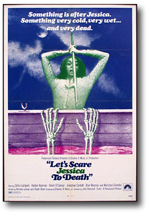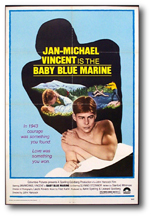ON “BANG THE DRUM SLOWLY”:
“Easily one of the best of the year in any category, and very possibly the best movie about sport ever made in this country. Director Hancock has great, knowledgeable fun with the game, but the genius of his movie lies in its introduction of the one subject that superbly conditioned young men rarely think about: death.”
Richard Schickel, Time Magazine“John Hancock’s ‘Bang the Drum Slowly’ is a remarkably faithful rendering of the well-known baseball novel by Mark Harris, and one of those rare instances in which close adaptation of a good book has resulted in possibly an even better movie. Hancock’s background is mainly in the theatre, and that background shows to stunning advantage. We are not so used to performance — as opposed, say, to ‘presence’ — -in movie acting. But if Hancock prospers, as he should, we may get used to it. This will be everyone’s good luck.”
Roger Greenspun, New York Times“Bang the Drum Slowly’ is the ultimate baseball movie. Yet as its shape begins to be visible, we realize it’s not so much a sports movie as a movie about those elusive subjects, male bonding and work in America. The director, John Hancock, is good with his actors and very good at establishing a lot of supporting characters without making a point of it. In its mixture of fatalism, roughness, tenderness and bleak humor, his movie seems to know more about the ways we handle death than a movie like ‘Love Story’ ever guessed. Four stars.”
Roger Ebert, Chicago Sun-Times“Best sports film ever made? As honest, mature, and genuine a picture as I have seen in a while. Without straining, it achieves a kind of dignity that is all too rare in movies today.”
Bruce Cook, National Observer“John Hancock’s direction is as intelligently understated as Harris’s script. Hancock, who was nominated for an Academy Award for his short film about touch-football fanatics, ‘Sticky My Fingers, Fleet My Feet,’ has moved with this film (his second feature) into the first rank of American film directors. Besides his technical poise, Hancock exhibits all the crucial ingredients — a keen intelligence, a fine eye for structure, wit, and, most important, a dogged resilience.”
John Lahr, Vogue Magazine“****! Highest rating! ‘Bang the Drum Slowly’ bats a perfect 1,000! Thanks to director John Hancock for an honest, straight-hitting movie, full of insight into human behavior.”
Kathleen Carroll, N.Y. Daily News“Beautiful to watch… superbly done, it evokes honest emotion made of laughter and tears, deep sentiment and great humanism.”
Judith Christ, PeopleON BRECHT’S EDWARD II:
“John Hancock is a great director, and this is the great play he needs to show off his best talents. It is as remorselessly theatrical as a trapeze or lion taming act, with the stunning punch of a kind of high-brow ‘Ice Follies.’ In some mysterious way Hancock has managed to meld what must have been little better than a pickup cast into one smoothly functioning organism, all inhabitants of ‘one world’ of hallucination. His direction is not just rhythmic, with a beat, but the beat swings, so the result is like a ballet to music by Theolonius Monk. Costume and design give just the right tone of lunatic ragamuffins to king and clown alike. The stage is not just mobile (turntables are not that important), it is always dynamic.”
Kenneth Rexroth, Chronicle/Examiner“…igniting the new season with a shattering and historic production…a brilliant and persuasive piece, boldly imaginative, superbly staged and acted, and of such significance that we must regard director John Hancock with considerable pride. He has combined in exciting fashion various bright theatrical effects with a most uncompromising disintegration of a young, ill-prepared, irresponsible monarch. Not only tough and relentless, this is a rich production that successfully reflects the spirit of Brecht.”
Knickerbocker, Chronicle“…made especially memorable by the bold, brilliant staging of John Hancock, who has, in essence, devised a fascinating side show, with flashing lights, brassy music, and earthy, weathered settings. The effect is ruggedly stunning.”
Eichelbaum, ExaminerON MIDSUMMER NIGHT’S DREAM:
“This brutal, vulgar, and erotic production of Shakespeare’s sex fantasy is the most original and arresting I’ve ever witnessed. Director John Hancock cuts through the 19th Century pieties which have covered this play and restores it to its original randiness.. This is the best of all the Dreams and an important pioneering effort in re-interpreting the play. Hail to director Hancock for presenting daring, freshness, and delight.”
Cue Magazine“Upon my arrival I was confronted by John Hancock’s strange version of ‘A Midsummer Night’s Dream,’ with sets and costumes by the Pop artist Jim Dine. As the play began a tarpaulin was jerked off a large object prominently placed downstage right, revealing a gaudily lit-up juke box which emitted Mendelssohn and Mahler at intervals throughout the evening. Hippolyta, Theseus’ captive mistress, wore only a loincloth, a bra, a great deal of black body make-up, some chains, a sullen expression and perhaps a wig; she played her first scene in a cage. Demetrius, one of the interchangeable youths, had a light bulb in his codpiece which flashed on and off whenever he was feeling amorous. And Helena, a maiden, was played by a man 6 feet 4 inches tall. These innovations were lively and theatrical; they got laughs; they “worked.” But, surprisingly enough, they were not just gimmicks, not mere effusions of irresponsible cleverness, not simple futzing around; they were the expressions of a consistent artistic intention. Love, he’s saying, is half itch and half obsession; it is productive of foolishness, confusion, cruelty and grief; yet in the end these things are transitory, and the production, like the play, ends with a powerful blessing on the wedding bed. Perhaps the most theatrically exciting piece of work I saw on my travels, it propounds with consistency and clarity (as well as vividness and wit) the notion that man’s sexuality makes him ridiculous and grotesque and betrays his pretensions to high-mindedness and beauty, and in so doing it fulfills Matthew Arnold’s grand old criterion for a work of art: it is a criticism of life. It is often said (though not by me) that the best directing is the least obtrusive. John Hancock, in the tradition of Reinhardt, Meyerhold, and Tyrone Guthrie, is clearly not letting that worry him unduly.”
Julius Novick, The Nation“Directed by John Hancock, the production is imaginative and beguiling — a once-in-a-lifetime experience. Lest it be inferred that Mr. Hancock’s innovations are gaucheries that change an enchanting fantasy to a grotesque venture in theatre of the absurd, be assured they do not. They are as expertly mortised in the play’s structure as original stage directions. Your reporter has a feeling that the author, from his celestial balcony seat, looks down on Mr. Hancock’s production with approval.”
American Magazine“…a thoroughly fascinating affair: resourceful, amusing, imaginative a high wire walk of considerable audacity by Hancock, and a triumph. While a revolving stage assists Hancock, the fertility of his theatrical invention is his greatest ally.”
Knickerbocker, S.F. Chronicle“If John Hancock’s unusual production is typical of the new program, excitement seems well on the way. Ingenious…uproarious.”
Henry Hewes, Saturday Review“The staging is nothing short of amazing. It’s a revelation of what an imaginative director-craftsman can do… With all these devices you might think the players would be submerged. Not so, Director Hancock sees to it that the winged words of Shakespeare are not lost in the tumults and storms of emotion.”
Pittsburgh Press“…the healthiest of theatre attitudes: The application of a director’s creative imagination to a work of classic stature; the interrelating of Elizabethan theatre with modern modes in art. Such an attempt is rare because too few directors are capable of even conceiving it. And directors like Mr. Hancock are to be treasured in this country.”
Gottfried, Women’s Wear DailyON A MAN’S A MAN:
“John Hancock has stamped his appropriately bold signature on Bertolt Brecht’s tin-pan hymn to the world that hate makes, and he has done it at two different levels. He has got the tinsel look and the saxophone sound of Brecht’s cabaret-style sermon. . . has been directed by John Hancock with such sympathy and authority that our eyes do open wide.”
Walter Kerr, New York Herald-Tribune“Under John Hancock’s direction, this production approaches the manner and mood of the Brecht theater in East Berlin. . . Although the Masque Theater’s stage is small, it has been used with imagination to provide a Brecht production of character. See this one!”
Howard Taubman, New York Times
“has been directed so imaginatively by John Hancock that it comes to life vividly on the stage, and it brings out the virtues of stage craftsmanship that must be the ones on which most of the Brecht fame rests.”
Richard Watts, Jr., New York Post“The excitement of Brecht is stylishly projected from the stage of the Masque Theatre, where A MAN’S A MAN has been given a taut and inventive production.”
Time Magazine“Effectively staged by John Hancock, it is worthy of praise under any conditions, not just in comparison to the rival pro-duction. . . the first success of the off-B’way season, MAN’S A MAN should have a long and healthy run.”
Variety“The New Repertory production has found the heart and genius of Brecht…director John Hancock is a rarity: an American with firm grip on the Epic style.”
Cue Magazine“…the production of A MAN’S A MAN under John Hancock’s direction is intelligent and to the point.”
Harold Clurman, Nation“Style was precisely the virtue of the Hancock-Bentley pro-duction. Most important was the detached and lively intelli-gence that Hancock brought to his work.”
Encore Magazine, London





